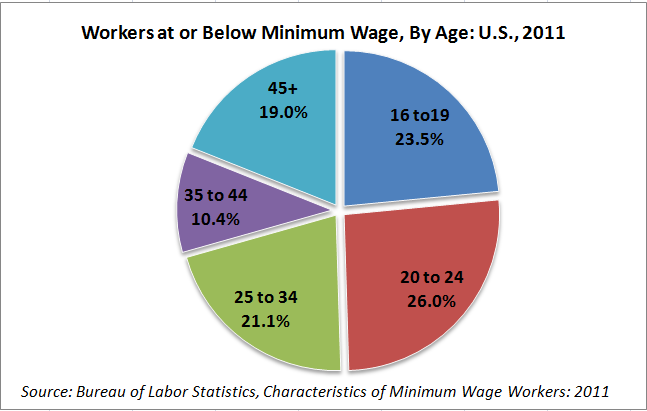
More teens are choosing alternatives to traditional summer jobs – lowering the minimum wage won’t change that.
Traditional summer jobs are losing luster as teens pursue better opportunities elsewhere. But will lobbyists use historic lows in teen employment to lead a new attack on Washington’s minimum wage?
Fewer than three in 10 American teenagers are projected to hold jobs between June and August this year. A still-weak economy has something to do with that – but as the Associated Press reports, today’s teens also realize your typical minimum wage job isn’t much of a resume builder:
The drop in teen employment, steeper than for other age groups, is partly a cultural shift. More youths are spending summer months in school, at music or learning camps or in other activities geared for college. … (And) older workers, immigrants and debt-laden college graduates are taking away lower-skill work as they struggle to find their own jobs in the weak economy.
Today’s teens and twenty-somethings can do the math: a minimum-wage job isn’t a great gig. And in many cases, they’re watching their own (and their friends’) parents weather a really tough recession. Is it a surprise they’re forgoing a tiny minimum wage paycheck in favor of long-term career building?
But while teens make up less than one-quarter of minimum wage workers (more than half are over age 25, and 3 in 10 are over age 35, according to the Bureau of Labor Statistics), they’re a far more sympathetic group than longtime minimum wage opponents like the Association of Washington Business, Washington Restaurant Association and the Washington Policy Center.
Perhaps that explains why those organizations are (coincidentally) partners in the just-launched Community Forums Network, which itself is (no doubt coincidentally) spotlighting youth unemployment, by (quite coincidentally) juxtaposing it with Washington’s minimum wage.
 Mainstream economists have long demonstrated high teen unemployment has more to do with increased competition from older workers than the minimum wage (see studies from MIT, UMass, UC Berkeley, and the BLS). In fact, among the 18 states with a higher-than-federal minimum wage, 7 have youth unemployment rates below the national level, 3 are within 1 percentage point of it, and 8 (including Washington) are above.
Mainstream economists have long demonstrated high teen unemployment has more to do with increased competition from older workers than the minimum wage (see studies from MIT, UMass, UC Berkeley, and the BLS). In fact, among the 18 states with a higher-than-federal minimum wage, 7 have youth unemployment rates below the national level, 3 are within 1 percentage point of it, and 8 (including Washington) are above.
Instead of flogging cheapskate economics and trying to cut the minimum wage, business lobbyists (and Washington’s legislators) would do better to promote the American maxim of an honest day’s work for an honest day’s pay.
They’d be rewarded for it: the most recent and economically sophisticated studies (which consider regional variation and long-term economic trends) found that a higher minimum wage not only results in better earnings for all ages, especially for teens in restaurants – it also results in substantial drops in costly job separations and turnover.
But I wouldn’t hold your breath. As Upton Sinclair famously noted, “It is difficult to get a man to understand something, when his salary depends upon his not understanding it!”
More To Read
September 24, 2024
Oregon and Washington: Different Tax Codes and Very Different Ballot Fights about Taxes this November
Structural differences in Oregon and Washington’s tax codes create the backdrop for very different conversations about taxes and fairness this fall
September 10, 2024
Big Corporations Merge. Patients Pay The Bill
An old story with predictable results.
September 6, 2024
Tax Loopholes for Big Tech Are Costing Washington Families
Subsidies for big corporations in our tax code come at a cost for college students and their families
